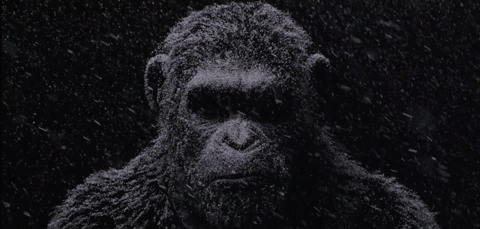
War of the Planet of the Apes is the final instalment of the reboot of 50-year-old Planet of the Apes franchise, empathetically imagining the fall of humanity from the apes’ perspective. It concludes the three-film journey of Caesar (in a mesmerising performance from Andy Serkis) who moves from science experiment to resistance leader to sacrificial saviour. War delves into the past of the Apes franchise with some delightfully subtle rhetorical, visual, and aural references to the original series. Vietnam-era war films are also clearly touchstones for the filmmakers, as the opening sequence is a homage to Apocalypse Now (as is Woody Harrelson’s laboured Brando/Kurtz inspired rogue colonel), with the literal fog of war obscuring our view of the action as the forest’s foliage protects and cloaks the apes. In War, the apes are framed as an indigenous tribe under siege from the technologically advanced but tactically inferior US military. The spear-wielding apes on horseback who first fought back in Dawn of the Planet of the Apes (2014) continue to defy the arrogant humans who consistently underestimate them.
The film critiques the ‘madness’ of war and colonial attitudes to the other, but also acts as ecocolonial critique as it engages with discussions and striking images of the irrepressible power of nature that humans attempt to tame and exploit. Nature fights back: the post-apocalyptic world presented in War and Dawn is not a wasteland but rather a green near-future (utopia?) where remnants of the human world (e.g. abandoned Coca-Cola trucks) are mossy monuments to humanity’s failures. War closes a cycle of films that are worthy successors to the original and show that in this era of Hollywood reboots and reimaginings it is possible to make a creative, thoughtful, and entertaining blockbuster.
This review originally appeared in Vector: The Critical Journal of the British Science Fiction Association (287) in their ‘Best of 2017’ edition published Spring 2018.
The British Science Fiction Association was founded in 1958 by British fans, authors, publishers and booksellers, in order to encourage engagement with SF in every form. It is an open membership organisation costing £29 per year for UK residents and £20 for the unwaged. See here for membership details: http://www.bsfa.co.uk/join-the-bsfa/

